Why goalkeeper Robert Sanchez could be Chelsea’s smartest signing

Chelsea’s spending spree has seen them bring a string of expensive superstars to Stamford Bridge, but their smartest signing might turn out to be a £25m goalkeeper who was out of favour at his previous club.
When Robert Sanchez arrived from Brighton in August, it wasn’t immediately obvious to me why Chelsea would want him, or even whether he would play.
I thought Sanchez was a decent keeper, sure, but his statistics certainly didn’t suggest he would be an upgrade on Kepa Arrizabalaga and he seemed an unlikely choice as a number one for a club chasing a return to the Champions League places by rebuilding on a big budget.
| Kepa | Sanchez | |
| 2565 | Minutes Played | 2070 |
| 35.96 | Expected Goals On Target Conceded | 24.51 |
| 30 | Actual Goals On Target Conceded* | 27 |
| +5.96 (3rd) | Goals Prevented | -2.49 (25th) |
| 1.20 (5th) | Goals Prevented Rate | 0.91 (=22nd) |
| 73.2% (5th) | Save % | 61% (25th) |
| 31.4 | Average passes per 90 min | 29.3 |
| 81% (5th) | Passing accuracy | 74.7 (8th) |
| *Excludes own goals |
So far, though, Sanchez has been both of those things. Not only has he started every game, he has been playing extremely well. Tottenham’s Guglielmo Vicario (77.8%) and Liverpool’s Alisson (76.3%) are the only keepers with a higher save percentage in the Premier League than his 75%.
I am not just talking about his saves, though, because the positive effect he’s had on a team which is in transition has been far greater than that.
Let’s not get carried away, because Mauricio Pochettino’s side is clearly still taking shape, but while they initially struggled to score goals and are still yet to fully click in attack, they have already appeared far more solid at the back than they did last season.
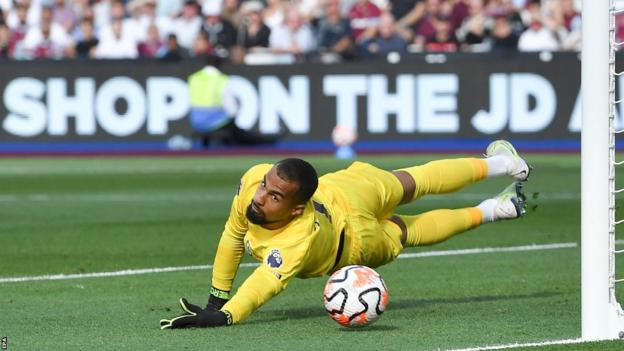
Sanchez has played a big part in that defensive improvement, and I wanted to explore how.
Firstly, I decided to stop looking at his numbers and take a closer look at the 25-year-old Spain international in action instead.
What I saw surprised me. His stats alone don’t really show anything special that stands out, but what my eyes told me was very different.
‘There’s something very smooth’ – what is Sanchez’s secret?
To understand the impact Sanchez has made since joining Chelsea, I think you have to start with his physical attributes. At 6ft 4.5in and 90kg he is definitely an imposing presence.
Height-wise there’s not a massive difference when you compare him to Kepa (6ft 2in) or former Blues keeper Edouard Mendy (6ft 3in) but the interesting thing is the way Sanchez uses his stature. There is something very smooth about the way he keeps goal, that I’d not noticed about him before.
I watched back clips from his games this season before putting together this article and what stands out is that, while he is big, he is also extremely agile. So, you have a combination of a powerful goalkeeper but also one with amazing reflexes.
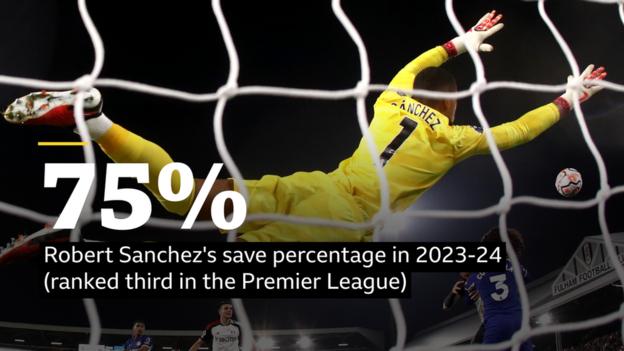
His movement was also intriguing when I studied it in detail. When you break down his technique, he is very economical with his footwork and how he gets into position.
By that I mean he never has to move very much – for example even when there is a transition and the opposition counter-attack quickly, he always seems to know where he is in relation to his goal.
From a goalkeeper’s point of view, all of this was actually really fun to watch. Sanchez never takes excess steps or has to readjust, because his instincts have put him where he needs to be to get a foot to the ball or block it.
He’s always clever with his angles and his positioning for cut-backs or crosses from wide areas, but a lot of the time he is very central whether he is in or out of possession. I think that kind of helps him break down the goal in terms of what he can actually cover.
His anticipation is excellent too. He is very patient in his set position for the most part but, from what I’ve seen, he is very good at reading triggers from whoever is about to shoot.
In two of the games where he kept clean sheets, against Bournemouth and Brighton, there were lots of different examples of this; where he sees something and starts to lean one way very early, which means he gets down to the shot very quickly.
Something else I noticed in those situations was how Sanchez uses his defenders to make the shooting angles smaller for the attackers, which again lets him anticipate – or in this case it’s more of a gamble – where the shot is going to go.
Whether he relies on them to cover the near post or the far post depends on how the attacker is approaching the ball.
In Chelsea’s game against Bournemouth, one dangerous attack from the home side saw Sanchez use Axel Disasi to block off the near post as Dominic Solanke shaped to shoot.
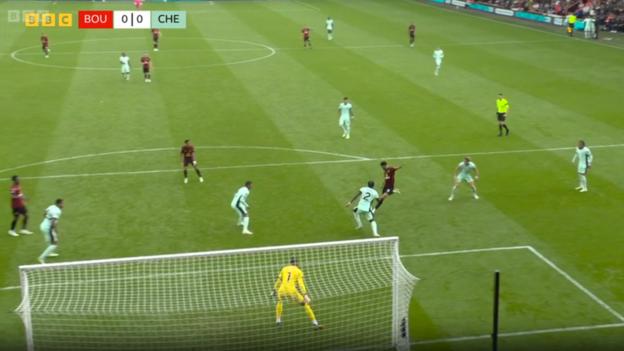
That allowed Sanchez to gamble and move further across, and he was in the correct position to make the save with his legs.
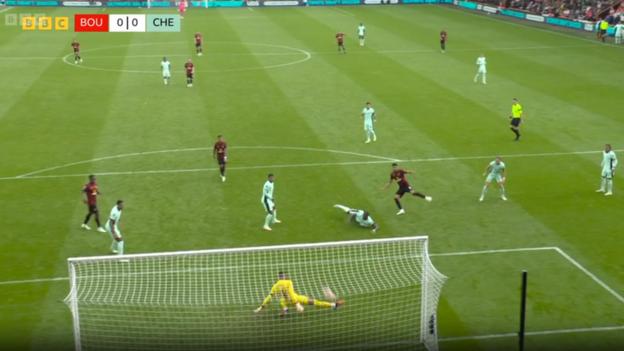
It may seem simple when you see this happen, but it’s actually a really under-valued skill, that can only come from having a good relationship with your defenders – something Sanchez has clearly established already.
When you look at all the different aspects of his game, he seems to have a lot of good habits that, from experience, I know are difficult to build. I would often chase the ball, or chase saves because I almost wanted to do too much.
Sanchez doesn’t do that, instead he seems to know where the ball is going to arrive and reacts. I don’t know what his secret is, but it’s very impressive to watch it happen, time and time again.
It means he makes a lot of saves you wouldn’t expect him to make, the ones where people go ‘oh, the striker should have scored there’. Sanchez makes them look easy just by being in the right place, which is another sign of a very good goalkeeper.
A good example of that perfect positioning can be seen below, when he denied Fulham’s Sasa Lukic from point-blank range in Chelsea’s win at Craven Cottage earlier this month.
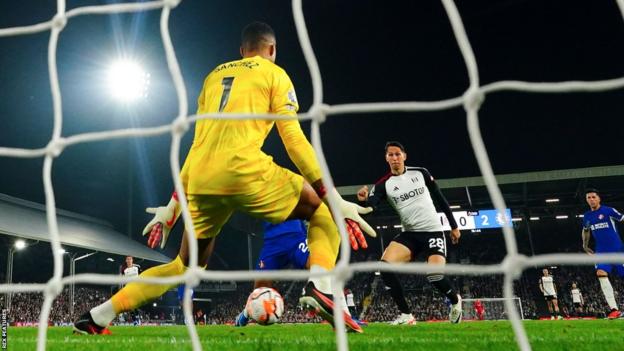
But it was one of Sanchez’s stops against Bournemouth that best illustrated the combination of anticipation and movement that I have been talking about, as well as his agility in making the actual save.
There was a situation where the ball came in from the goalkeeper’s right, with Chelsea defenders marking the Cherries players on the edge of the area but leaving Dango Ouattara free to run in for what seemed to be an easy first-time finish.
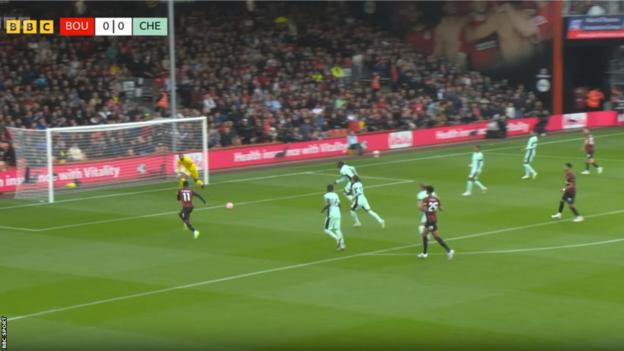
You watch it and think ‘oh this is definitely going to go in’ but Sanchez manages to quickly get across, and then throws himself into the save.
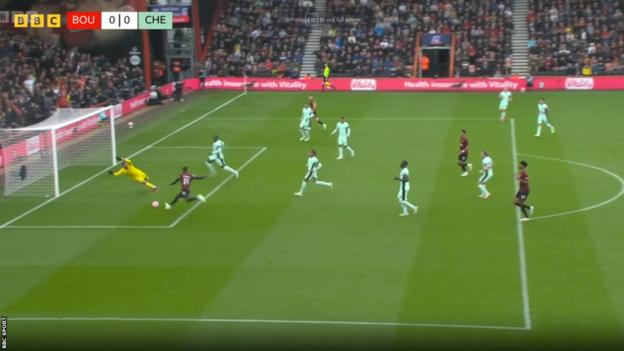
He has to understand the trajectory of the ball across his goal but he is directly to it, then is full spread to make an incredible save at the far post.
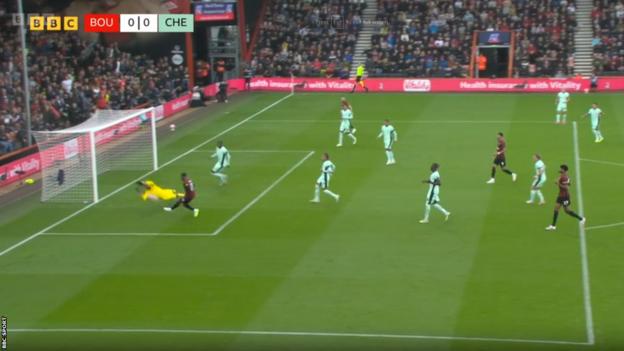
That game finished 0-0 so there’s an example of his impact – that’s at least one point he has earned Chelsea this season, and I feel like there will be plenty more.
A keeper who is comfortable with crosses and cutbacks
Chelsea’s improvement at the back is not just down to Sanchez, of course. Tactically, Pochettino has put an emphasis on tightening them up and, despite a number of injuries, they have become a much more settled side in terms of defensive personnel.
Watching their games back, you can see they are now making a lot of blocks and also often limit the opposition to lower quality chances by forcing them wide to shoot.
Like Sanchez, their centre-halves Thiago Silva and Disasi have started every Premier League game this season. That’s given Chelsea some much-needed stability and that duo’s physical stature alone means they are very competent in central areas, dealing with balls that come into the box.
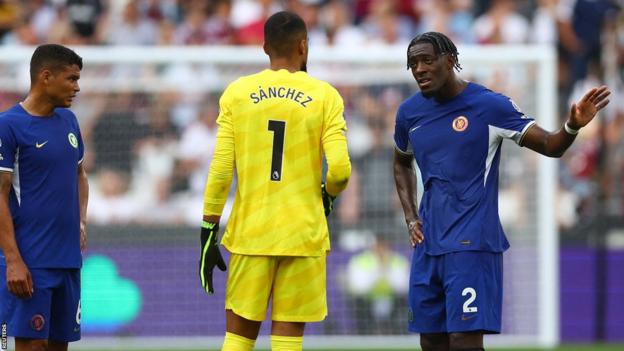
On top of that, behind them they now have a keeper who looks very comfortable and confident taking high crosses or dealing with any sort of cutback, which is the biggest difference between him and Kepa – and, at the end of his Chelsea career, Mendy too.
Credit where credit is due, Kepa had moments of brilliance for Chelsea, where he made some incredible saves, but he was extremely inconsistent and we often saw him struggle with his pass selection or decision making.
Ultimately it was his ability to deal with crosses that let him down but his distribution became an issue too.
He would play long floated balls out to his full-backs, leaving them very vulnerable. It led to an awful lot of transition moments, quick counter-attacks and goalscoring opportunities against Chelsea.
Similarly, Mendy had some amazing times at Stamford Bridge, and helped them win the Champions League in 2021, but the things he was brought in for – his shot-stopping and commanding presence – were wavering in his final months at the club before he moved to Saudi Arabia last summer.
There was a lot going on at Stamford Bridge for both keepers, who played under numerous managers and alongside lots of different players. That obviously didn’t help.
But I noticed last season that Kepa and Mendy both looked like they were glued to their line a lot of the time. I don’t know if that was something they’d been told to do, or whether they were waiting for their centre-halves to clear the danger.
Yes, they could both rely on their shot-stopping ability from there, but they looked increasingly uncomfortable with dealing with crosses and corners as the campaign progressed.
If Pochettino identified that as a problem then I can understand why he saw Sanchez as a potential solution.
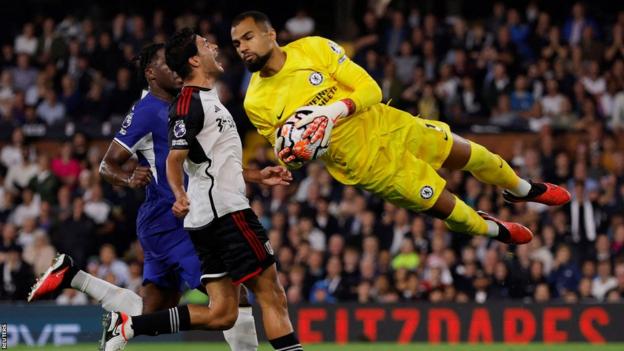
He is coming over bodies and through crowds to get to the ball, and seems like he genuinely wants to take control of situations in the box.
It makes it so much easier for a defence if you know your keeper is going to come and take responsibility, rather than being indecisive about it.
A calmer presence at the back
Sanchez has got the attitude and the work-rate his manager wants, and I think his distribution is a positive too – even though one of the reasons he lost his place at Brighton was because Jason Steele was better at drawing the press and playing the type of passes Roberto de Zerbi wanted.
Steele had the best passing accuracy of any Premier League keeper last season (87.7%) but it was another area where, on paper, Kepa (81%) was also better than Sanchez (74.7%), even though Kepa played more long passes.
I don’t see passing being a problem for Sanchez, though – far from it, in fact. It looks like the Chelsea team already has a lot of confidence in him on the ball, and they have quickly developed a relationship with him that works.
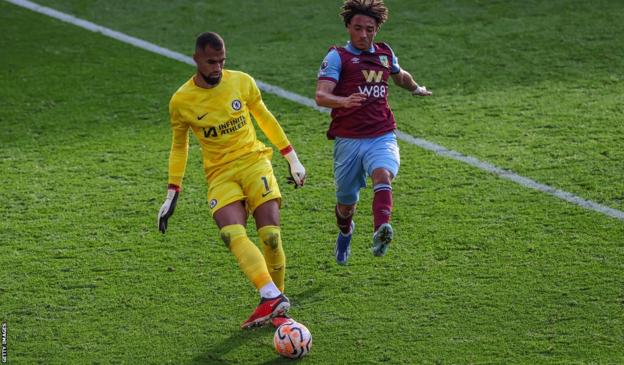
That’s happened because Sanchez is calm in possession and is comfortable to take it in tight spaces and play risky balls, including into his central midfielders the way the Seagulls use Steele.
Yes, Sanchez makes mistakes too, but they don’t seem to faze him – nothing really does! – and, in any case, the team are not giving away as many transitions in dangerous areas as they were previously.
In fact, when I’ve watched him on the ball, the consistency and accuracy of his passing has allowed Chelsea to progress up the pitch quicker, which is the point of that type of possession. It feels like another part of his game where he is somewhat underrated, and he feels like the perfect fit for the way they want to play under Pochettino.
Chelsea’s next opponents, Arsenal, surprised a few people when they brought in David Raya this summer, and we are still waiting to find out how their goalkeeping situation plays out.
It’s early days for Sanchez too, but after seeing what he’s done so far, I’m no longer wondering why Chelsea signed him. Instead, I am looking forward to watching more of him, and seeing what saves he pulls off next.
Karen Bardsley was speaking to BBC Sport’s Chris Bevan.

